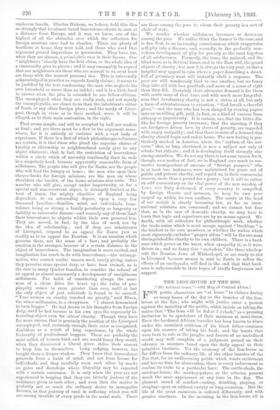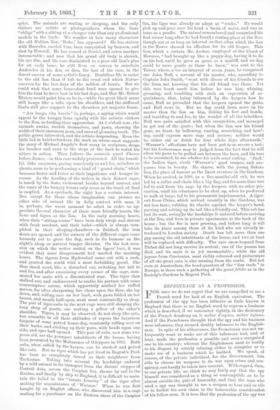THE LION-HOUSE AT THE ZOO.
[" Hic habitant Zeones."—Old Map of Central Africa.]
FEW public characters are "at home" to visitors during so many hours of the day as the inmates of the lion- house at the Zoo ; who might with justice enter a protest against the incivility of the public, which insists on taking the notice that "The lions will be fed at 3 o'clock," as a pressing invitation to be spectators of their manners at meal-times. Even the hardened African traveller has been known to wince under the sustained criticism of his black fellow-creatures upon his manner of taking his food ; and the beasts that were born to rule in the jangles and deserts of an uncivilised world may well complain of a judgment passed on their advance in manners based upon the daily appeal to their primitive instincts. Yet the economy of the lion-house so far differs from the ordinary life of the other inmates of the Zoo that, for an undiscerning public which wants excitement and has no time for observation, there is every inducement to confine its visits to a particular hour. The cattle-sheds, the antelope-house, the monkey-palace, or the aviaries, present much the same appearance at any time in the day. The pleasant round of comfort—eating, drinking, playing, or sleeping—goes on without variety or long cessation. But the life of the great carnivora is ordered differently, and with greater exactness. In the morning, in the lion-house, all is
quiet. The animals are resting or sleeping, and the only. -visitors are artists or photographers, whom the lions 'oblige" with a sitting at a cheaper rate than any professional models in the trade. We wonder in how many characters the old Nubian lion, 'Duke,' has appeared P He has striven with Hercules, carried Una, been vanquished by Samson, and shot by Nimrod. He has roared at Daniel, and eaten martyrs innumerable ; and now that his grand old body is shrunk, his eye dim, and his roar diminished to a poor old lion's plea for an early bone, he still lives on canvas to entertain Androeles in his den, or dies, the last of his race, in the desert cavern of some artist's fancy. Doubtless life is easier to the old lion than if left to the cruel end which Nature reserves for the last days of the noblest of beasts. But we could wish that some benevolent fund were opened to give him the food he loves best in his last days, and that Mr. Briton Riviere would paint him as he is,—while the great black mane still hangs like a robe upon his shoulders, and the stiffened limbs still give support to the shrunken yet majestic frame.
"Are longs, vita brevis" is, perhaps, a saying which would appeal to the hungry lions equally with the artistic visitors to the Zoo, as feeding-time approaches. At 2 o'clock am , the Animals awake, stretch themselves, and yawn, showing the width of their enormous jaws, and rows of gleaming teeth. The public grows interested, and the artists desponding. Even the little lad in knickerbockers, the work on whose easel suggests -the story of Michael Angelo's first essay in sculpture, drops his brushes and runs to the steps at the back to watch his sitters in action. Then follows the mauvais quart d'heure before dinner,—in. this case unduly protracted. Al! the beauti- ful, lithe creatures, pacing ceaselessly to and fro, noiseless as ghosts, seem to be performing a kind of "grand chain," which becomes faster and faster as their impatience and hunger in- crease. As the howling of the wolves in their distant cages is heard by the lions, excitement breaks beyond control, and the roars of the hungry beasts only cease as the truck of food is emptied. As a spectacle, the sight has a certain interest. -But except for those whose imagination can picture no eother side of animal life in daily contact with man, it is, perhaps, the worst moment to. select in order to ap- ,preciate the real character of those most friendly beasts, the lions and tigers at the Zoo. In the early morning hours, when their " sitting-rooms " have been duly swept and strewn with fresh sawdust, and their toilet—which is always com- pleted in their sleeping-chambers—is finished, the iron doors are opened, and the owners of the different cages come leisurely out to greet the day, each in its humour as the .night's sleep or natural temper dictates. On the last occa- sion on which the writer waited on the tigers' levee, it was evident that some disagreement had marked the morning hours. The tigress from Hyderabad came out with a rush, sand greeted the world with a most forbidding growl. She then stood erect, like a disturbed cat, switching her tail to and fro, and after examining every corner of the cage, sum- moned her mate with a discontented roar. The- tiger then stalked out, and endeavoured to soothe his partner with some -commonplace caress, which apparently soothed her ruffled nerves, for after sharpening her claws upon the floor, she lay ,down, and, rolling over on her back, with paws folded on her breast, and mouth half-open, went most contentedly to sleep. The pair of tiger-cubs in the next cage were still sleeping the long sleep of youth, one making a pillow of the other's shoulder. Tigers, it may be observed, do not sleep like cats, .but resemble in all their attitudes of repose the luxurious d
angour of some petted house-dog, constantly rolling over on their backs, and sticking up their paws, with heads upon one side, and eyes half-opened. This pair of cubs, now some two years old, are the Youngest inhabitants of the house, having teen presented by the Maharanee of Ocleypore in 1892. Both cubs, when called by the keeper, h 1 can be stroked and petted like cats. But no tiger whi
has been so completely tea has yet lived in. Regent's Park med s as their neighbour from Turkestan. Taking into account the hardships endured by a wild animal in its transport from the distant steppes of Central Asia, across the Caspian Sea, thence by rail to the .Euxine, and finally by ship to England, it is difficult to main- tain the belief in the "innate ferocity" of the tiger after making the acquaintance of 'Warsaw.' When he was first bought by an English officer, who discovered him in a cage waiting for a purchaser on the Eastern shore of the Caspian
Sea, the tiger was already an adept at "tricks." He would pick up and pour over his head a basin of water, and was as tame as a poodle. The animal remembered and recognised his first owner long after he had found a resting-place at the Zoo, though not at so long an interval as that after which the lion in the Tower showed its affection for its old keeper. This lion, which a certain Mr. Archer, employed at the Court of Morocco, "had brought up like a, puppy-dog, having it to lie on his bed, until he grew as great as a mastiff, and no dog could be more gentle to those he knew," was sent, to the Tower, where, a' ter an interval of seven years, he recognised one John Bull, a servant of his master, who, according to Captain John Smith, "went with divers of his friends to see the lions, not knowing that his old friend was there. Yet this rare beast smelt him before he saw him, whining, groaning, and tumbling with such an expression of ac- quaintance, that, being informed by the keepers how he came, Bull so prevailed that the keepers opened the grate, and Bull went in. But no dog could fawn more on his master than the lion on him, licking his feet and hands, and tumbling to and fro, to the wonder of all the beholders. Bull was quite satisfied with this recognition, and managed to get out of the grate ; but when the lion saw his friend gone, no beast, by bellowing, roaring, scratching, and howl- ing, could express more rage and Borrow; neither would he either eat or drink for four whole days afterwards." 'Warsaw's 'affections have not been put to so severe a test ; but his forbearance may be judged from the fact that he will allow his paws to be pulled out between the bars, and his toes to be examined, to see whether his nails want cutting. Jack,' the Indian tiger, rivals 'Warsaw's' good temper, and sur- passes him in beauty. He shares, with the young Sokoto lion, the place of honour as the finest creature in the Gardens. When he arrived, in 1888, as a five-months'-old cub, he was led by a collar and chain like a big dog, and for some time was led to and from his cage by the keepers with no other pre- caution, until his reluctance to be shut up, when he preferred to walk at large, led to his permanent imprisonment. A tiger- cub from China, which arrived recently in the Gardens, was not less tame, rubbing its cheeks against the keeper's hand, purring and setting up its tail liken friendly cat. This cub has lost its coat, owing;to the hardships it endured before arriving at the Zoo, and lives in private apartments at the back of the house ; but the fur is now growing, and before long it will take its place among those of its kind who are already in- troduced to London society. Death has left more than one gap among the old inhabitants of the house, and two at least will be replaced with difficulty. The rare snow-leopard from Thibet did not long survive its arrival; one of the pumas has died, and its mate is as yet unconsolable ; while the old jaguar from Corrientes, most richly coloured and picturesque of all the great cats, is also missing from the ranks. But not even at Amsterdam, the head-quarters of the "lion trade" in Europe, is there such a gathering of the great felidx as in the Society's Gardens in Regent Park.



































 Previous page
Previous page